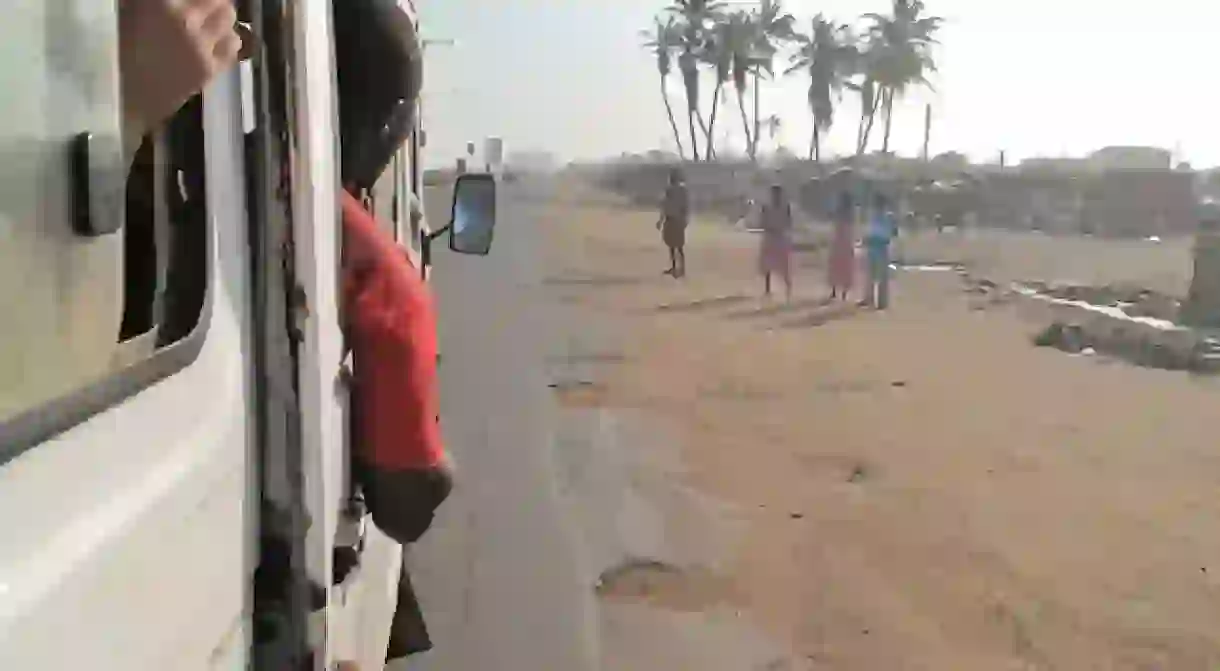How to Travel on Tro-tros in Accra

The cheapest and undoubtedly one of the most popular forms of transport used by about 70% of the populace in Ghana and several parts of West Africa is the tro-tro; the popular minivan.
The tro-tro is manned by a driver and a conductor, locally called “mate.” The average Ghanaian finds the boarding of the tro-tro less complicated than a tourist who has never tried it, though getting the hang of it is not so sophisticated.

Boarding a Tro-tro
You can flag down a tro-tro which is not yet full by waving a hand to grab the attention of the driver or conductor. The conductor stylishly and effortlessly leans out of the side door of the moving vehicle and makes hand signals which suggest the direction the car is headed to.
The finger-in-a-stir gesture signals that the tro-tro is headed for Kwame Nkrumah Circle Interchange when you’re in Accra or a popular roundabout anywhere else. You can confirm with the driver or mate when they stop after you’ve flagged them down. Sometimes they hit their horn when they see you idling by the roadside. This is to prompt you to signal if you’re going in their direction or not.
Seating Tips
Usually, the tro-tro seating is done by arrangement from the back seats, though passengers who get to board first capture the seats next to the windows for fresh air. The front seats, which are usually a pair, are filled regardless of the situation at the back seats. Those with long legs fancy using the front seats or spots with much leg room next to the window on the collapsible seat lane. Due to the compact seating, at a stop, you might have to get down to make way for another passenger trying to get on or alight and climb back up in time to continue the journey.

No Set Times of Operation
Tro-tros usually pick passengers from the town bus stations and wouldn’t move until they are full sometimes. Otherwise, they pick passengers up from the street side on the go. Especially in the middle belt and southern parts of Ghana, they run in chains, so don’t panic when you miss one heading to your direction. At bus stations, the name of the destination is usually inscribed on brick-sized wooden boards and placed on the car. Tro-tro drivers in Ghana are usually readier to pick a passenger at a random space along the road than to stop for one to alight at such a spot. On the bright side, they would use routes off the GPS to beat traffic any day.
The conductor collects the fares before the bus moves or does it on the way, during the journey. Passengers at the rear end pass their fares on to those nearer to the conductor’s seating position till it gets to the mate. There are no marked departure and arrival times. Most times when the tro-tro is filled to capacity, the mate ‘sacrifices’ his seat. Normally, passengers do not have to wait long when they go directly to the town bus stations or stand at routes regularly plied by tro-tros to catch a ride.

Journey Tips
Seats next to the windows are preferable because otherwise you could be sandwiched. Do take precaution with handling your phone out the window in busy market centres like Circle-Accra or Ashaiman station though. Ghana is a lovely place with amazing people, just like in every major city around the globe, there might be a few bad nuts who spoil the soup; like pickpockets and phone snatchers at crowded city centers waiting for the moment you unknowingly prop out to browse your phone in traffic.
On a brighter note, the compact nature of tro-tros sets the tone for conversations and this is advantageous for new passengers to get information about destinations and directions or tourist attractions google might not navigate. To prevent the hassle of time wasted on searching for change, it’s preferable to keep some change just for your travel. There are interestingly designed humorous, proverbial, religious, motivational statements or simply nicknames and slogans boldly inscribed on tro-tros that you should look out for.

Your Destination
At your point of destination, alert the mate by stating your point of destination. The locals usually use the Twi term ewomu,literally meaning “it is inside,” expressing their presence in the vehicle as it gets in close proximity to where they want to alight. If you’re not sure of the spot, keep alerting the mate or a friendly passenger next to you to not forget your destination point, and they will surely take you there. There is a Tro-tro Diaries page where you can get more tips and a tech institution called MEST, that is working with the Accra Metropolitan Assembly to launch an app to facilitate the tro-tro experience.













